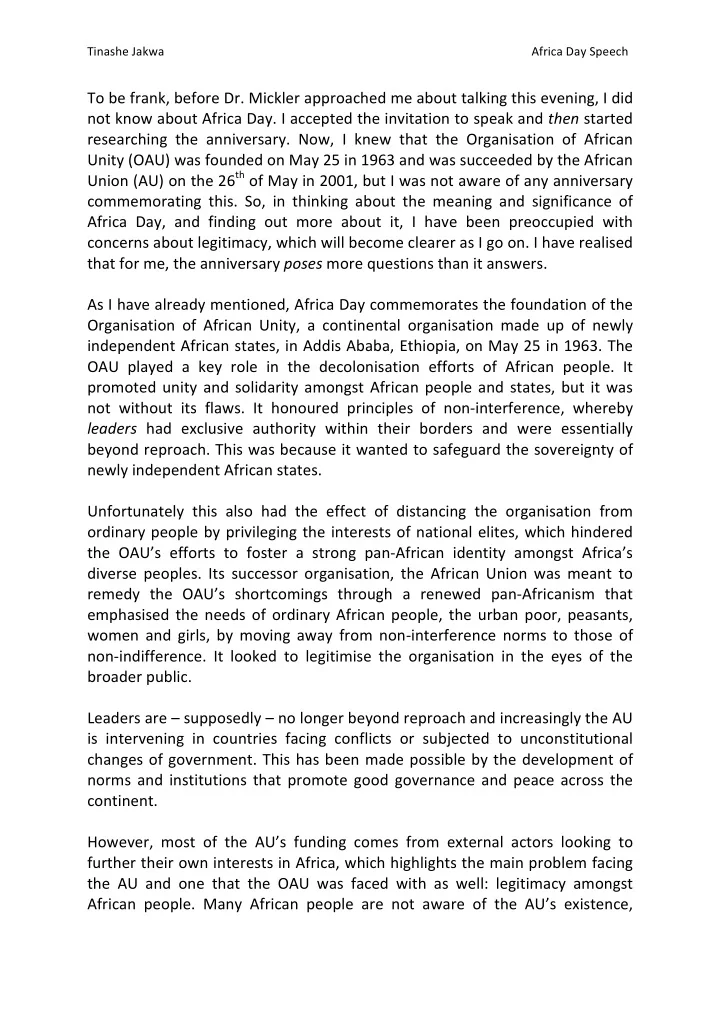

Tinashe ¡Jakwa ¡ ¡ ¡ ¡ ¡ ¡ ¡ ¡ ¡ ¡ ¡ ¡ ¡ ¡ ¡ ¡ ¡ ¡ ¡ ¡ ¡ ¡ ¡ ¡ ¡ ¡ ¡ ¡ ¡ ¡ ¡ ¡ ¡ ¡ ¡ ¡ ¡ ¡ ¡ ¡ ¡ ¡ ¡ ¡ ¡ ¡ ¡ ¡ ¡ ¡ ¡ ¡ ¡ ¡ ¡ ¡ ¡ ¡ ¡ ¡ ¡ ¡ ¡ ¡ ¡ ¡ ¡ ¡ ¡ ¡ ¡ ¡ ¡ ¡ ¡ ¡ ¡ ¡ ¡ ¡ ¡ ¡ ¡ ¡ ¡ ¡ ¡ ¡ ¡ ¡ ¡ ¡ ¡ ¡ ¡ ¡ ¡ ¡ ¡ ¡ ¡ ¡ ¡ ¡ ¡ ¡ ¡ ¡ ¡ ¡ ¡ ¡ ¡ ¡ ¡ ¡ ¡ ¡ ¡ ¡ ¡ ¡Africa ¡Day ¡Speech ¡ To ¡be ¡frank, ¡before ¡Dr. ¡Mickler ¡approached ¡me ¡about ¡talking ¡this ¡evening, ¡I ¡did ¡ not ¡know ¡about ¡Africa ¡Day. ¡I ¡accepted ¡the ¡invitation ¡to ¡speak ¡and ¡ then ¡started ¡ researching ¡ the ¡ anniversary. ¡ Now, ¡ I ¡ knew ¡ that ¡ the ¡ Organisation ¡ of ¡ African ¡ Unity ¡(OAU) ¡was ¡founded ¡on ¡May ¡25 ¡in ¡1963 ¡and ¡was ¡succeeded ¡by ¡the ¡African ¡ Union ¡(AU) ¡on ¡the ¡26 th ¡of ¡May ¡in ¡2001, ¡but ¡I ¡was ¡not ¡aware ¡of ¡any ¡anniversary ¡ commemorating ¡ this. ¡ So, ¡ in ¡ thinking ¡ about ¡ the ¡ meaning ¡ and ¡ significance ¡ of ¡ Africa ¡ Day, ¡ and ¡ finding ¡ out ¡ more ¡ about ¡ it, ¡ I ¡ have ¡ been ¡ preoccupied ¡ with ¡ concerns ¡about ¡legitimacy, ¡which ¡will ¡become ¡clearer ¡as ¡I ¡go ¡on. ¡I ¡have ¡realised ¡ that ¡for ¡me, ¡the ¡anniversary ¡ poses ¡more ¡questions ¡than ¡it ¡answers. ¡ ¡ As ¡I ¡have ¡already ¡mentioned, ¡Africa ¡Day ¡commemorates ¡the ¡foundation ¡of ¡the ¡ Organisation ¡ of ¡ African ¡ Unity, ¡ a ¡ continental ¡ organisation ¡ made ¡ up ¡ of ¡ newly ¡ independent ¡African ¡states, ¡in ¡Addis ¡Ababa, ¡Ethiopia, ¡on ¡May ¡25 ¡in ¡1963. ¡The ¡ OAU ¡ played ¡ a ¡ key ¡ role ¡ in ¡ the ¡ decolonisation ¡ efforts ¡ of ¡ African ¡ people. ¡ It ¡ promoted ¡unity ¡and ¡solidarity ¡amongst ¡African ¡people ¡and ¡states, ¡but ¡it ¡was ¡ not ¡ without ¡ its ¡ flaws. ¡ It ¡ honoured ¡ principles ¡ of ¡ non-‑interference, ¡ whereby ¡ leaders ¡ had ¡ exclusive ¡ authority ¡ within ¡ their ¡ borders ¡ and ¡ were ¡ essentially ¡ beyond ¡reproach. ¡This ¡was ¡because ¡it ¡wanted ¡to ¡safeguard ¡the ¡sovereignty ¡of ¡ newly ¡independent ¡African ¡states. ¡ ¡ ¡ Unfortunately ¡ this ¡ also ¡ had ¡ the ¡ effect ¡ of ¡ distancing ¡ the ¡ organisation ¡ from ¡ ordinary ¡people ¡by ¡privileging ¡the ¡interests ¡of ¡national ¡elites, ¡which ¡hindered ¡ the ¡ OAU’s ¡ efforts ¡ to ¡ foster ¡ a ¡ strong ¡ pan-‑African ¡ identity ¡ amongst ¡ Africa’s ¡ diverse ¡ peoples. ¡ Its ¡ successor ¡ organisation, ¡ the ¡ African ¡ Union ¡ was ¡ meant ¡ to ¡ remedy ¡ the ¡ OAU’s ¡ shortcomings ¡ through ¡ a ¡ renewed ¡ pan-‑Africanism ¡ that ¡ emphasised ¡the ¡needs ¡of ¡ordinary ¡African ¡people, ¡the ¡urban ¡poor, ¡peasants, ¡ women ¡ and ¡ girls, ¡ by ¡ moving ¡ away ¡ from ¡ non-‑interference ¡ norms ¡ to ¡ those ¡ of ¡ non-‑indifference. ¡ It ¡ looked ¡ to ¡ legitimise ¡ the ¡ organisation ¡ in ¡ the ¡ eyes ¡ of ¡ the ¡ broader ¡public. ¡ ¡ ¡ Leaders ¡are ¡– ¡supposedly ¡– ¡no ¡longer ¡beyond ¡reproach ¡and ¡increasingly ¡the ¡AU ¡ is ¡ intervening ¡ in ¡ countries ¡ facing ¡ conflicts ¡ or ¡ subjected ¡ to ¡ unconstitutional ¡ changes ¡of ¡government. ¡This ¡has ¡been ¡made ¡possible ¡by ¡the ¡development ¡of ¡ norms ¡and ¡institutions ¡that ¡promote ¡good ¡governance ¡and ¡peace ¡across ¡the ¡ continent. ¡ ¡ ¡ However, ¡ most ¡ of ¡ the ¡ AU’s ¡ funding ¡ comes ¡ from ¡ external ¡ actors ¡ looking ¡ to ¡ further ¡their ¡own ¡interests ¡in ¡Africa, ¡which ¡highlights ¡the ¡main ¡problem ¡facing ¡ the ¡ AU ¡ and ¡ one ¡ that ¡ the ¡ OAU ¡ was ¡ faced ¡ with ¡ as ¡ well: ¡ legitimacy ¡ amongst ¡ African ¡ people. ¡ Many ¡ African ¡ people ¡ are ¡ not ¡ aware ¡ of ¡ the ¡ AU’s ¡ existence, ¡
Recommend
More recommend